Feeling like FreeCRM.com isn't quite cutting it anymore? Or maybe you're just window shopping for a new CRM tool?
We've rolled up our sleeves and dug deep into the CRM world to bring you the top 5 FreeCRM alternatives that can help your business. These aren't your run-of-the-mill options – we're talking about some serious contenders here.
So, let's explore these five FreeCRM alternatives. Who knows? You might just find your perfect CRM match.
What is FreeCRM.com?
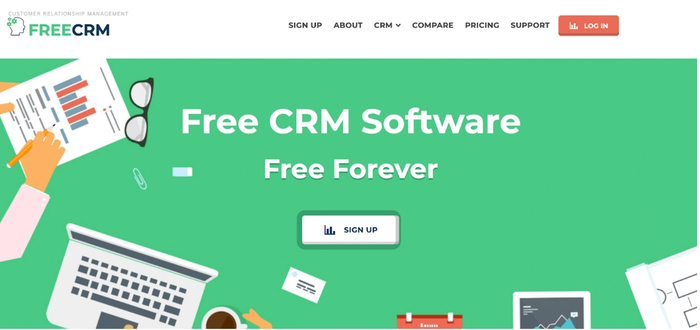
FreeCRM.com is a lesser-known cloud-based customer relationship management (CRM) software platform designed to help businesses manage their customer interactions, sales processes, and marketing efforts.
The platform supports various business functions, such as direct mail campaigns, SMS marketing, or email alerts.
One of FreeCRM's key selling points is its free-forever plan, which provides basic CRM functionality at no cost. Even so, like many free CRM offerings, this plan has limitations compared to paid versions. The platform also offers paid plans with additional capabilities.
Key features of FreeCRM include:
- Company and contact management: Centralize and organize all your customer and prospect information in one place.
- Sales dashboards: Get a visual overview of your sales performance and key metrics at a glance.
- Deals and sales pipeline visualization: Track and manage your sales opportunities through customizable pipeline stages.
- Marketing campaigns: Create, execute, and monitor marketing initiatives directly within the CRM.
- Task and event tracking: Stay on top of your to-do list and schedule with integrated task management and calendar features.
- Call tracking and scheduling: Log calls, set follow-ups, and manage your customer communications history.
- Mail merge: Generate personalized emails and documents for multiple recipients.
- Alerts and reminders: Never miss an important deadline or follow up with automated notifications.
- Form builder: Create custom web forms to capture leads and customer information directly into your CRM.
- Data import and export: Migrate your existing data into FreeCRM.com and export data for analysis or backup.
- Reporting: Generate insightful reports on various aspects of your business activities and performance.
- Mobile apps for iOS and Android: Access your CRM data and functionality on-the-go from your smartphone or tablet.
- Data backup: Ensure your valuable customer and business data is securely backed up and protected.
FreeCRM positions itself as a solution suitable for businesses of all sizes, from small teams to large enterprises. Even so, its free plan has its limitations, such as the lack of campaigns, forms, email integration, API, voice calling, and social media integration.
FreeCRM.com pricing
FreeCRM.com offers three pricing tiers:
Free Plan
$0 (free forever)
Provides a basic range of features such as unlimited storage, customer support, contacts, companies, deals, tasks, cases, calls, calendars, docs, reports, and more.
Pro Plan
$10 per month
Includes all features from the Free plan, plus additional capabilities like campaigns, forms, email, Google Sync or QuickBooks integration, and more.
Enterprise Plan
$25 per month
Offers all features from the Pro plan, plus API access.
All plans include unlimited storage and customer support. The main differences between the plans are the availability of certain advanced features like campaigns, API access, and integrations with other services.
FreeCRM emphasizes that their service is "pay as you go monthly with no long-term contracts," which provides flexibility for users. They also offer mobile apps for both iOS and Android platforms across all pricing tiers.
But even with that being said, there are some other challenges with FreeCRM.com you should know about.
Why you might be seeking alternatives to FreeCRM.com
- Limited native integrations. FreeCRM.com integrates only with Quickbooks – and only in the paid plans. You would need to use Zapier to connect to other software.
- Outdated UI. Some users mention that the user interface could use a refresh. Just looking at it might remind you of the early 2000s internet.
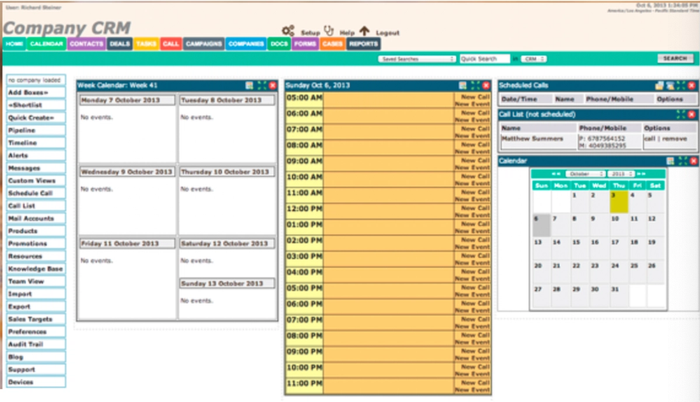

- Steep learning curve. It might take a technical professional to help you get acquainted with the platform. It's not the easiest to use and might require some coding knowledge to make the most of it

- Not much customization and reporting. Users would appreciate more options to customize the dashboard or reports. (source)
- Scalability issues. As your company grows and the number of contacts increases, you may find that Freecrm.com is not enough for your needs.

As you can see, while FreeCRM.com offers completely free CRM software, there are some areas that could be improved. All of these issues might push you into upgrading to a paid plan or switching to something else.
Luckily, we've got you covered with these five handpicked CRM systems that might be a better fit for your business.
#1 Capsule CRM – your ideal alternative to FreeCRM.com
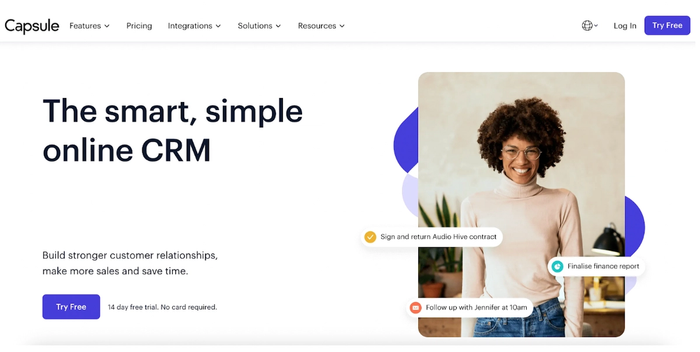
Capsule CRM is a user-friendly, cloud-based customer relationship management solution that's perfect for small to medium-sized businesses. Known for its simplicity and ease of use, Capsule CRM stands out with its clean interface and straightforward approach to managing contacts, sales pipelines, and tasks.
It sets itself apart through a powerful free-forever CRM plan and affordable paid tiers, which makes it accessible to startups and growing businesses alike.
Capsule CRM focuses on delivering essential CRM features without overwhelming users with complex, less useful functionalities. Still, its features do pack a punch. A a CRM solution, it strikes a perfect balance between simplicity and effectiveness.
Capsule CRM features
- Contact management: Capsule CRM allows users to manage even up to 50,000 contacts (on the Professional plan). It centralizes all customer information, including communication history, documents, and social media activity, giving a comprehensive view of each contact.
- Sales pipeline tracking: Users can create customizable sales pipelines to track opportunities through various stages. The system allows for multiple pipelines, which is particularly useful for businesses with various sales processes for different products or services.
- Task and calendar management: Capsule CRM integrates task management and calendar features, which allow users to schedule follow-ups, set reminders, and manage their daily activities directly within the CRM.
- Custom fields and tags: The platform offers extensive customization options, such as the ability to create custom fields and tags to tailor the CRM to specific business needs.
- Email integration: Capsule CRM integrates with popular email providers, like Gmail and Outlook to track email communications within the CRM.
- Mobile app for iOS and Android: Capsule CRM offers intuitive mobile apps for both iOS and Android, which enable users to access and update CRM data on the go.
- Complex reporting and analytics: This CRM system includes powerful reporting tools for creating custom reports on sales performance, pipeline health, and other key metrics.
- Integration with popular business tools: Capsule CRM integrates with many third-party applications, like Xero, Freshbooks, Mailchimp, Zendesk, and various marketing automation platforms.
Who uses Capsule CRM?
Capsule CRM is typically used by:
- Small businesses and startups looking for a simple, user-friendly CRM solution.
- Sales teams seeking an easy-to-adopt platform for managing customer relationships.
- Companies that need basic contact management and sales pipeline tracking.
- Freelancers and consultants who want a straightforward way to organize client information.
- Service-based businesses that require a CRM with task and calendar management features.
- Organizations looking for an affordable CRM with a generous free plan option.
- Teams that prefer a clean, intuitive interface without complex functionalities.
- Businesses transitioning from spreadsheets to their first CRM system.
- Small to medium-sized enterprises need customizable fields and sales processes.
Capsule CRM pricing
Capsule CRM offers four distinct pricing tiers that serve various business needs.

All paid plans are billed monthly without long-term contracts, and Capsule CRM offers a 14-day free trial for businesses to test the software before committing.
Each plan includes main CRM features like contact management, task tracking, and sales pipeline visualization, as well as mobile apps for iOS and Android. The tiered structure allows businesses to start with a basic plan and upgrade as their needs grow.
However, it comes as a great alternative to FreeCRM.com because, in fact, it is a free CRM too. The Free plan allows you to add 2 users and manage up to 250 contacts.
Why Capsule CRM is a solid alternative to FreeCRM
Capsule CRM is one of the best alternatives to FreeCRM.com due to its perfect blend of simplicity and functionality. It offers a clean, intuitive interface that doesn't require extensive training – which simplifies it for teams to adapt quickly. Just take a look at what the users say:



The generous free plan allows small businesses to get started without any financial commitment, while the affordable paid tiers provide room for growth. Capsule CRM focuses on core CRM features without adding unnecessary complexity. This way, users can manage their customer relationships well, free from getting bogged down in complicated features they might never use.
#2 Pipedrive
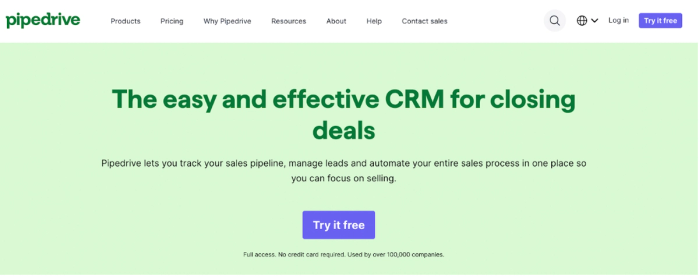
Pipedrive is a well-known sales-focused CRM that is recognized for how easy it is for you to monitor your pipeline. A visual, drag-and-drop interface that looks like a traditional sales funnel is meant to help sales teams keep track of leads and deals.
Pipedrive differentiates itself by putting a lot of emphasis on activity-based selling, which tells users to focus on things that move deals forward. Pipedrive's clean design and flexible pipelines help sales teams stay organized and focus on the most promising opportunities.
Pipedrive features
- Visual sales pipeline management
- Customizable deal stages and fields
- Email integration and tracking
- Activity scheduler and reminders
- Mobile apps for iOS and Android
- Sales forecasting and reporting
- AI-powered sales assistant
- Two-way email sync
- Integration with 300+ third-party apps
Pipedrive pricing
Pipedrive offers four pricing tiers, billed monthly or annually, with a discount for annual plans.
- The Essential plan starts at $14.90 per user per month and offers basic CRM features.
- The Advanced plan at $24.90 per user per month adds workflow automation and group emailing.
- The Professional plan, priced at $49.90 per user per month, includes revenue forecasting and enhanced security features.
- The Enterprise plan, at $99 per user per month, offers additional customization, support, and advanced security options.
All plans come with a 14-day free trial.
Why you might not like Pipedrive
- Limited email marketing capabilities compared to more comprehensive CRM solutions. (source)
- Lack of advanced project management features for businesses needing robust project tracking.

- Some users find it challenging to integrate with third-party tools, often requiring Zapier as an intermediary. (source)
- The mobile app functionality is sometimes criticized as being less effective than the desktop version.

- It can be repetitive for data entry, which may be frustrating for users handling large volumes of information. (source)
- Larger organizations or those with complex sales processes might find Pipedrive's simplicity too constraining.

- The reporting capabilities, while improved, may still fall short for businesses requiring in-depth, highly customizable analytics. (source)
Pipedrive is good for pipeline visualization, but it may not suffice for businesses with more complex sales processes. If you're an enterprise with thousands of deals going on, you might want to look elsewhere.
#3 Copper CRM
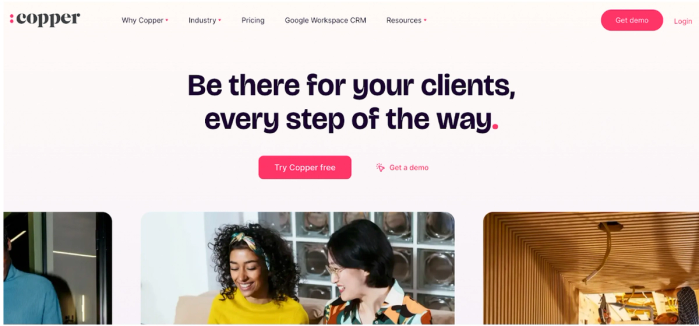
Copper CRM is a web-based software solution designed specifically for Google Workspace users. It's best known for its native integration with Google's suite of productivity tools, such as Gmail, Google Calendar, and Google Drive.
Copper stands out by offering a user-friendly interface that mimics Google's design so that it feels like a natural extension of the Google ecosystem. It allows users to manage relationships and track deals without leaving their familiar Google environment.
Copper CRM features
- Deep Google Workspace integration
- Automated data entry and contact management
- Customizable sales pipelines
- Email tracking and templates
- Task and calendar management
- Reporting and analytics
- Mobile apps for iOS and Android
- Opportunity and lead tracking
- Workflow automation
Copper CRM pricing
- The Basic plan starts at $29 per user per month and includes essential CRM features with a limit of 2,500 contacts.
- The Professional plan, priced at $69 per user per month, adds more advanced features like email automation and reporting, with a 15,000 contact limit.
- The Business plan, a whopping $134 per user per month, offers unlimited contacts and advanced features like lead scoring and sales forecasting.
All plans come with a 14-day free trial. Copper's pricing is competitive within the CRM market, especially considering its specialized Google Workspace integration.
Why you might not like Copper CRM
- Lack of built-in email marketing features compared to more comprehensive CRM solutions (source)
- No free plan is available. Many of FreeCRM's competitors offer free plans, so you may find this deciding factor.
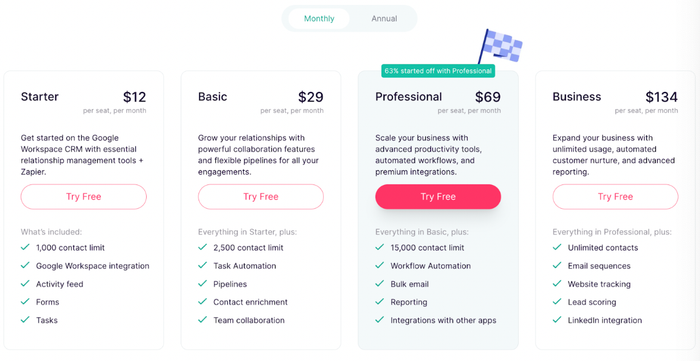
- Customer service is lacking, with some users claiming unsatisfactory troubleshooting and lack of response.

- Reporting capabilities, while improved, may still be less powerful than those of other CRM tools (source)
- The learning curve might be steeper for non-Google Workspace users and those without any coding experience

- Some users report occasional syncing issues with Google services (source)
- Higher-tier plans can become expensive for larger sales and marketing teams, potentially pricing out some small businesses (source)
All in all, Copper CRM is great for Google Workspace users, but there are certain issues with it. Customer service could be better, the software could be simpler to use, and it could have native integrations with email marketing software.
#4 Nimble CRM

Nimble CRM is a social-centric customer relationship management software designed specifically for sales teams. It's best known for its contact management capabilities and deep social media integration.
Nimble can automatically enrich contact profiles with social media data, providing sales reps with comprehensive insights about their leads and customers. Nimble works well for salespeople who use social selling a lot and need quick access to contextual customer information. It focuses on relationship intelligence and integrates with popular suites like Office 365 and G Suite.
Nimble CRM features
- Automatic customer data enrichment
- Social media listening and engagement
- Email tracking and templates
- Sales pipeline management
- Task and calendar management
- Mobile apps for iOS and Android
- Group messaging capabilities
- Smart contact widget for web browsers
- Integration with Office 365 and G Suite
Nimble CRM pricing
Nimble CRM offers a straightforward pricing structure with a single plan called Nimble Business, priced at $25 per user per month when billed annually, or $29 per user per month when billed monthly. This plan includes all of Nimble's features without any restrictions on the number of contacts or storage. Nimble also provides a standard 14-day free trial for users to test the platform before committing.
Why you might not like the Nimble CRM
- It's tough to customize Nimble without prior technical knowledge, and it can get expensive for small businesses

- Reporting and analytics capabilities are not as advanced as some competitors (source)
- No free plan available for very small teams or solopreneurs
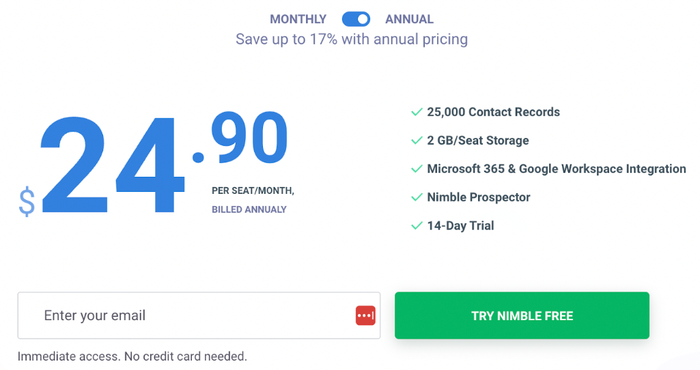
source: nimble.com
- Limited third-party integrations compared to larger CRM platforms (source)
- Some users report occasional issues with data syncing across different platforms

- The learning curve might be steeper for users less familiar with social media-centric tools (source)
Nimble CRM stands out with its auto-enrichment features. And yet, it does pose some challenges, such as a steep learning curve, not the best reporting, and a lack of a free plan. If you are a small business, you might want to check out other options.
#5 Insightly CRM
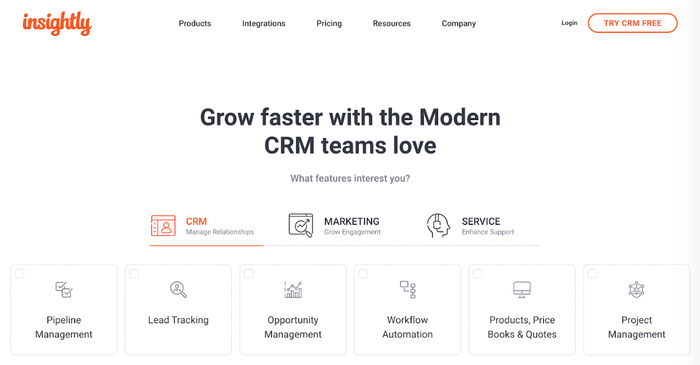
Insightly is best known for combining CRM features with project management tools in a way that doesn't require any extra work. This lets businesses handle both customer relationships and project workflows in one place.
Insightly connects contacts, organizations, and projects in a way that few other tools do. It gives a full picture of interactions with customers and project progress. Companies that work on many client projects or have complicated sales processes will like this integration.
Insightly CRM features
- Advanced project management tools
- Customizable sales pipelines
- Email tracking and templates
- Workflow automation
- Mobile apps for iOS and Android
- Detailed reporting and analytics
- Integration with popular business tools
- Lead routing and assignment
- Custom dashboards and fields
Insightly CRM pricing
Insightly CRM offers three main pricing tiers, billed annually.
- The Plus plan starts at $29 per user per month and has rudimentary CRM features and basic project management.
- The Professional plan, priced at $49 per user per month, adds advanced features like workflow automation and custom dashboards.
- The Enterprise plan, at $99 per user per month, offers the full suite of features like advanced permissions and API access.
Insightly also provides a limited free plan for up to two users, which allows teams to test the platform before committing. All paid plans come with a 14-day free trial and give users the opportunity to explore the full feature set before making a decision.
Why you might not like Insightly CRM
- The learning curve can be steep due to the extensive feature set (source)
- Users report its marketing automation capabilities are not working as expected (source)
- Custom reporting can be complex and may require technical expertise

- The pricing can be higher than some alternatives, especially for smaller teams (source)
- Limited third-party integrations compared to more established CRM platforms

- Some users find the interface less intuitive than other CRM solutions (source)
- Limited customization options in lower-tier plans may not suit businesses with specific workflow needs

As we've explored Insightly CRM and its unique blend of customer relationship management and project management capabilities, it's clear that the CRM landscape offers diverse solutions to meet various business needs.
#6 – Agile CRM
Agile CRM is another alternative that combines sales and service features into one platform. It’s a popular CRM choice for small businesses that want more automation power than Free CRM offers.
Key features
- Contact and deal tracking
- Marketing automation (email campaigns and landing pages)
- Helpdesk and ticketing tools
- Appointment scheduling
- Telephony integration
- Social media monitoring
Considerations and challenges
- Outdated interface compared to newer CRMs.
- Limited customer support availability.
- Some features, like telephony, require paid add-ons.
Pricing
- Free plan for up to 10 users
- Starter: $14.99/user/month
- Regular: $49.99/user/month
- Enterprise: $79.99/user/month
Agile CRM is great for small businesses that want an all-in-one solution at an affordable price, but larger organizations may outgrow its capabilities.
Now that we've examined these different CRM options, let's step back and consider the broader picture. What insights can we glean from this overview of CRM solutions? What should businesses keep in mind when selecting the right CRM for their needs?
Choosing the best FreeCRM.com alternatives
Selecting the right CRM solution for your business depends on various factors, such as your specific needs, budget, and existing tools. Here are some key considerations to help you choose the best FreeCRM.com alternative:
- Ease of use: Consider how user-friendly the CRM is. If your team finds the tool intuitive and easy to use, its adoption will be smoother and more effective.
- Features and functionality: Identify the essential features your business requires, such as contact management, sales pipeline visualization, marketing automation, and reporting capabilities. Check that the CRM you choose offers these functionalities.
- Integration capabilities: Check if the CRM integrates well with your existing tools and systems, such as email platforms, marketing automation tools, and other business applications.
- Scalability: Assess whether the CRM can scale with your business as it grows. Look for solutions that offer flexible plans and the ability to upgrade features and capacity as needed.
- Customization: Determine how much customization the CRM allows. The ability to tailor the CRM to your specific business processes and workflows is what can help you filter out your options.
- Cost: Evaluate the pricing structure of each CRM. Consider both the short-term and long-term costs, and confirm the chosen solution fits within your budget.
- Customer support: Look into the level of customer support provided. Reliable support can be extremely important, especially during the initial setup and if any issues arise.
- User reviews and feedback: Research user reviews and testimonials to get a sense of other businesses' experiences with the CRM. Doing this can provide you with valuable insights into the tool's strengths and weaknesses.
Select the right CRM software now!
Well, there you have it – a whirlwind tour of FreeCRM.com alternatives that'll make your head spin (in a good way, of course). With Capsule CRM, you might just find the Goldilocks "just right" CRM you've been looking for.
With its user-friendly interface, powerful feature set, and pricing that won't make your wallet weep, Capsule CRM strikes a sweet spot for businesses of all sizes. Plus, a free-forever CRM which you can test out all you want.
So, why not give Capsule CRM a spin? Your future self – and your sales team – might just thank you for it.




